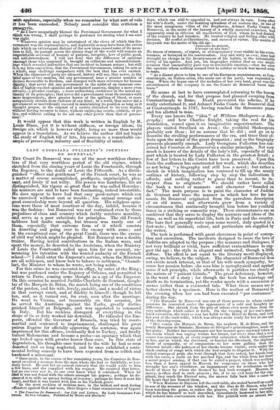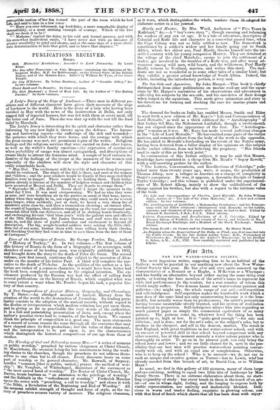LADY GEOEGIANA Fl7LLEHTON'S COUNTESS DB BONNEVA.L. * Tin Count De Bonneval
was one of the most worthless charac- Vers of that very worthless period of the old regime, which stretched from the closing years of Louis the Fourteenth, through the Regency, to the death of Louis the Fifteenth. As a distin- guished " officer and gentleman" of the French court, he was as a matter of course accomplished, profligate, unprincipled, plea- sant, and lively if not witty. His person was handsome, his air distinguished; his vigour so great that he was called Hercules ; his manners are said to have been fascinating, indeed irresistible. /Ea does appear to have had that easy good-nature which can Ur exercised without cost or trouble ; his animal courage and tom& comradeship were beyond all question. His religious opin- Mus.were those of most courtiers of the day, infidel, because it Was the fashion ; but Bonneval was not restrained even by those prejudices of class and country which feebly reinforce morality, and serve as a poor substitute for principles. The old French noblesse had faults enough, but treason was rarely one of them, especially that extreme form of it which consists in. deserting and going over to the enemy with arms ; and in the exceptional case of the great Conde, there was the excuse of-civil war which might be pleaded. But Bonneval was a double traitor. Having levied contributions in the Italian wars, and spent the money, he deserted to the Arabians, when the Ministry of Louis the Fourteenth called upon him for an account, an- nouncing his intention with the wonted audacity of the French school—" I shall enter the Emperor's service, where the Ministers are all noblemen, and know how to behave to noblemen," Chamil- lart, the Minister to whom he wrote, not being noble. For this crime he was executed in effigy, by order of the King ; but was pardoned under the Regency of Orleans, and permitted to return to Paris, coming some thought as a spy of the Emperor. Oh this occasion he married Judithe Charlotte de Gontaut, daugh- ter of the Marquis de Brion, the match being one of the conditions of the pardon, and his wife, lovely, amiable, and a model of virtue in that corrupt court, and of fidelity to himself ; though he left her, and, as it turned out, for ever, soon after the marriage. Re went to Vienna, not treasonably on this occasion, for he served the Austrians against the Turks, greatly distin- guished himself at Belgrade, and was appointed to command in. Italy. But his reckless disregard of everything in the shape of tie or duty worked his downfall. He ridiculed the Em- peror offended the Governor of Brussels, was tried by court- marbal and sentenced to imprisonment, challenged his great patron Eugene for officially approving the sentence, was again imprisoned for this offence, eventually fled to Turkey, and finally turned Mahometan and became a pasha—an apostacy which that age looked upon with greater horror than ours. In this state of degradation, his thoughts once turned to the wife he had so soon deserted and so long neglected, and he once exhibited a senti-
mental feeling scarcely to have been expected from so selfish and hardened a miscreant.
" Once again, in the course of her remaining years, the Countess de Bon- novel received a message from the man whom she had so faithfully, so ten- derly loved. He sent her an earnest entreaty that she would write to him a few lines, and she complied with his request. He received that letter, hilt= one ever saw it, no one ever knew what it contained. When he died: it was not, found with the others amongst his papers ; perhaps he de- stsoyed it to stifle an uneasy feeling, of remorse ; perhaps he wore it next his heart, and that it was buried with him in his Turkish grave.
"In the most reckless of reckless men, in the boldest and most daring offenders against God and man, there lingers a faint reminiscence of bygone
4 The Canntees De Dentinal: her Life and Letters. By Lady Georgian Ful- lerton. In two volumes. Published byllurat and Blaekett. days, which can still be appealed to, and not always in vain. Long altos his wife's death, under the dazzling splendbur of an eastern sky, in one of the most sumptuous villas of the Bosphorus, Achmet Pasha Comte do Bonneval, in the midst of- the luxury of a- wholly material existence, bad apparently sunk in oblivion all recollection of God, whom he had denied, of the country he had forsaken. He treated religion and feeling once with derision. He scoffed at Christianity, and sneered at virtue. The maxim of hisyouth was the motto of hia old, age :
' Jouiesons du prtsent, L'avenir est aux ions.'
No traces of remorse, of regret, or of despondency were visible in his coml. tenant*, or betrayed in his conversation. Gay and witty as ever, time bad wrought no change la the licentiousness of his habits, or the indomitable, levity of his spirits. And yet, his biographer relates that on one single occasion that insensibility gave way to irresistible emotion,—that for once the apostate whom nothing seemed ever to subdue or touch was moved even, to tears.
"At a• dinner given talim by one of his European acquaintances, at Con- stantinople, an Italian artist, who made one of the party, was requested to sing. When she began one of the melodies of her own land, great was the astonishment of the company to see the Comte de Bonneval burst ittto tears."
He seems at last to have contemplated returning to the boson of the church, and for that purpose had planned escaping from Constantinople to Rome. Death prevented the scheme, if he really entertained it, and Achmet Pasha Comte de Bonneval died, at Constantinople in 1747; having reached the threescore yearn and ten allotted to man.
Every one knows the " idea " of William Shakspere—a Bio- graphy; and. how Charles Knight, taking the real for his foundation, reared upon it an imaginative superstructure. The players visited Stratford on Avon ; the youthful Shakespeare probably saw them ;. let us assume that he did ; and go on to describe the strolling performances of the era, and trace their ef- fects upon the mind of the great dramatist ; and so the biography proceeds pleasantly enough. Lady Georgiana Fullerton has con- ceived her Countess de Bonneval on a similar principle. Not very much is known of the details of the lady's life, especially of that part which is treated by Lady Fullerton in the greatest detail; few of her letters to the Count have been preserved. Upon this basis the authoress has constructed her work, which she describes as not being " a biography and still less a novel ; but rather a sketch in which imagination has ventured to fill up the scanty outlines of history, following step by step the indications it affords, and seeking rather to guess than to invent; to in- terpret than to originate." We should rather have called the book a novel of manners and character "founded on, fact." The main purpose is to paint the character of Judithe de Gontant and trace the manner in which her love for her cousin De Bonneval originated from the garrulous description of an old nurse, and afterwards grew from a variety of circumstances that continually brought him before her youthful fancy in a striking or romantic way. These circumstances are so contrived that they serve to display the manners and ideas of the time, as well as its superficial life, both in Paris and the country. The bare fact generally rests upon some record, duly quoted in a foot-note ; but incident, colour, and particulars are supplied by the writer.
The task is performed with great cleverness in point of concept Lion and execution. The incidents designed to cause the love of Judithe are adapted to the purpose ; the manners and dialogues, if not very brilliant or vivid, have sufficient vraisemblanee to sng gest the age ; the style is elegant and animated, though a little diffuse. The effect is not equal to the literary merit displayed, owing, we believe, to the subject. The character of Bonneval does not excite much interest, or that of his wife much sympathy, be- cause her passion before she sees him is metaphysical and against sense if not principle, while afterwards it partakes too closely of the nature of " patient Grizzle." The great deficiency, however, is the want of a story ; for though the book has marriage and death as its termination, yet the reader meets with a succession of scenes rather than a connected tale. What those scenes are is better shown by a specinien. Here is the mother of Bonneval in the evening when her son had been executed " par contumaco"
during the day.
"The Marquise de Bonneval was one of those persons in whom violent passions lie 'concealed under the appearance of a cold and haughty in- difference. She shrunk from the pity of others even more than from the very sufferings which called it forth. On the evening of her son's simu- lated execution, she went as was her habit to the Hotel de Biron, and took her seat at the card-table, which was always made ready for her at one end of the drawing-room. " Her cousin the Marquis de Biron, his nephew, M. de Riom' and the lovely Marquise de Simian, Madame de Sevigne's granddaughter, made up her party. Neither her countenance nor her manner gave outward token of the storm which was raging within her breast, but every time that a new comer was announced, at every respectful salutation which was addressed to her, and in which she discerned, or fancied she discerned, the slightest shade of sympathy, or of compassion—to her more galling than the bitterest insult—the paleness of her cheeks became visible, even under the thick coating of rouge with which she had sought to disguise it. With the stoical courage of pride she went through that fiery ordeal, her hands busy with the cards, a smile on her parched lips, and the while from her heart a secret prayer arising, if that can be called a prayer, which was nothing less than a fierce appeal to Heaven for vengeance on those who had wrought her son's overthrow, an impassioned cry for retribution on the heads of those by whom she deemed he had been wronged. Heaven, in mercy, is often deaf to such prayers ; for, if in an evil hour for the sup- pliant, they reach the Eternal earn, the answer falls back like a curse en the heart that has framed them. "When Madame de Simiane left the card-table, she seatedlierself on a sofa in one of the recesses of the window, and the Due de St. Simon, who had been watching the game, or rather the players, with that keen curiosity which he has himself so well described, immediately hastened to her side,and entered into conversation with her. She pointed with an almost un-
perceptible motion of her fen toward the part of the room which he had Ieft, and said to him in alma voice -
64 ILave you ever witnessed,.my lord duke, a more remarkable-display of insensibility, or a more striking example of courage. Which of the two shall we deem it to be ?'
" Madame,' replied the duke, in his cold and formal manner, and with . his somewhat malevolent smile, I have never met with an instance of greater sensibility to grief and shame, and at the same time of a more obsti- nate determination to hide that grief, and to brave that.disgrace.' "



























 Previous page
Previous page